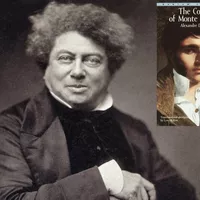Chapter 12. Father and Son (1)
M. Noirtier--for it was, indeed, he who entered--looked after the servant until the door was closed, and then, fearing, no doubt, that he might be overheard in the ante-chamber, he opened the door again, nor was the precaution useless, as appeared from the rapid retreat of Germain, who proved that he was not exempt from the sin which ruined our first parents. M. Noirtier then took the trouble to close and bolt the ante-chamber door, then that of the bed-chamber, and then extended his hand to Villefort, who had followed all his motions with surprise which he could not conceal.
"Well, now, my dear Gerard," said he to the young man, with a very significant look, "do you know, you seem as if you were not very glad to see me?" "My dear father," said Villefort, "I am, on the contrary, delighted; but I so little expected your visit, that it has somewhat overcome me." "But, my dear fellow," replied M. Noirtier, seating himself, "I might say the same thing to you, when you announce to me your wedding for the 28th of February, and on the 3rd of March you turn up here in Paris." "And if I have come, my dear father," said Gerard, drawing closer to M. Noirtier, "do not complain, for it is for you that I came, and my journey will be your salvation." "Ah, indeed!" said M. Noirtier, stretching himself out at his ease in the chair. "Really, pray tell me all about it, for it must be interesting." "Father, you have heard speak of a certain Bonapartist club in the Rue Saint-Jacques?" "No. 53; yes, I am vice-president." "Father, your coolness makes me shudder." "Why, my dear boy, when a man has been proscribed by the mountaineers, has escaped from Paris in a hay-cart, been hunted over the plains of Bordeaux by Robespierre's bloodhounds, he becomes accustomed to most things. But go on, what about the club in the Rue Saint-Jacques?" "Why, they induced General Quesnel to go there, and General Quesnel, who quitted his own house at nine o'clock in the evening, was found the next day in the Seine." "And who told you this fine story?" "The king himself." "Well, then, in return for your story," continued Noirtier, "I will tell you another." "My dear father, I think I already know what you are about to tell me." "Ah, you have heard of the landing of the emperor?" "Not so loud, father, I entreat of you--for your own sake as well as mine. Yes, I heard this news, and knew it even before you could; for three days ago I posted from Marseilles to Paris with all possible speed, half-desperate at the enforced delay." "Three days ago? You are crazy. Why, three days ago the emperor had not landed." "No matter, I was aware of his intention." "How did you know about it?" "By a letter addressed to you from the Island of Elba." "To me?" "To you; and which I discovered in the pocket-book of the messenger. Had that letter fallen into the hands of another, you, my dear father, would probably ere this have been shot." Villefort's father laughed. "Come, come," said he, "will the Restoration adopt imperial methods so promptly? Shot, my dear boy? What an idea! Where is the letter you speak of? I know you too well to suppose you would allow such a thing to pass you." "I burnt it, for fear that even a fragment should remain; for that letter must have led to your condemnation." "And the destruction of your future prospects," replied Noirtier; "yes, I can easily comprehend that. But I have nothing to fear while I have you to protect me." "I do better than that, sir--I save you." "You do? Why, really, the thing becomes more and more dramatic--explain yourself." "I must refer again to the club in the Rue Saint-Jacques." "It appears that this club is rather a bore to the police. Why didn't they search more vigilantly? they would have found"-- "They have not found; but they are on the track." "Yes, that the usual phrase; I am quite familiar with it. When the police is at fault, it declares that it is on the track; and the government patiently awaits the day when it comes to say, with a sneaking air, that the track is lost." "Yes, but they have found a corpse; the general has been killed, and in all countries they call that a murder." "A murder do you call it? why, there is nothing to prove that the general was murdered. People are found every day in the Seine, having thrown themselves in, or having been drowned from not knowing how to swim." "Father, you know very well that the general was not a man to drown himself in despair, and people do not bathe in the Seine in the month of January. No, no, do not be deceived; this was murder in every sense of the word." "And who thus designated it?"

